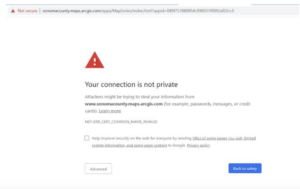Disclosure: This post contains affiliate links. I may receive compensation when you click on links to products in this post. For an explanation of my Advertising Policy, visit this page. Thanks for reading!
Does SSL affect Google ranking?
Yes! Google has in fact, confirmed that SSL does affect Google ranking. Google confirmed this as far back as 2014.
In this blog post, “HTTPS as a ranking signal” on the Google Search Central Blog, Google stated that, “…over the past few months we’ve been running tests taking into account whether sites use secure, encrypted connections as a signal in our search ranking algorithms. We’ve seen positive results, so we’re starting to use HTTPS as a ranking signal.”
So websites that don’t use SSL are definitely at a disadvantage to those websites that SSL do, that is of course, if all other SEO factors are equal.
In fact, if you’re using Chrome, make sure you have a valid certificate, otherwise, your visitors will see a warning telling them your site is unsafe. Like this one below:

How much does SSL affect SEO?
SSL (Secure Sockets Layer) is a standard security protocol for establishing encrypted links between a web server and a browser in an online communication.
The main purpose of SSL is to keep sensitive information such as credit card numbers, social security numbers, and login credentials confidential while they are being transmitted over the internet.
While SSL is not technically a ranking factor, it is an important part of website security and can affect SEO in several ways.
For example, HTTPS websites rank better in Google search results than HTTP websites.
This is because HTTPS is a signal to Google that a website is trustworthy and provides a better user experience.
In addition, SSL can help protect against malware and phishing attacks, and can improve website speed.
Overall, SSL is a vital part of website security and should be a priority for any business that wants to rank well in search results and provide a safe experience for users.
While it may not directly impact SEO, it is an important part of a website’s overall security and can indirectly affect SEO in several ways.
Why is SSL good for SEO?
SSL benefits SEO in a few ways.
First, it builds trust with users. When they see the little green lock in their browser bar, they know their connection is secure and that their data is safe.
This builds confidence and can encourage them to stay on your site longer, interact more, and even make purchases.
Second, SSL can help you rank higher in search results. Google has stated that they give preference to sites that use SSL, so it’s definitely something worth doing if you want to improve your SEO.
Third, SSL helps protect your site from malware and hackers.
By encrypting data and making it harder for malicious actors to access sensitive information, you can keep your site and your users safe.
This can also reduce the chances of Google penalizing your site for security issues.
Overall, SSL is good for SEO because it builds trust, improves search rankings, and increases security.
It’s a win-win all around, so if you don’t have SSL on your site yet, now is the time to get it!
How does an SSL certificate help website rank?
SSL certificates help websites rank by providing a secure connection for visitors.
This helps to ensure that sensitive information, such as credit card numbers and passwords, are not intercepted by malicious third parties.
In addition, SSL certificates can also help to improve search engine rankings by increasing the trustworthiness of a website.
This is because search engines often take into account the level of security offered by a website when ranking its search results.
As a result, SSL certificates can help to improve the visibility of a website in search engine results pages (SERPs).
HTTP vs HTTPS in Google ranking.
The debate between HTTP and HTTPS has been a hot topic for years, with many people arguing that one is better than the other.
While there are some valid points to be made on both sides, the fact remains that HTTPS is the better choice when it comes to Google ranking. Here’s why:
HTTPS is a more secure protocol than HTTP, and Google has stated on multiple occasions that security is a top priority for them.
In fact, they’ve even said that HTTPS is a ranking factor.
While HTTP sites are still indexed and ranked by Google, it’s clear that the company prefers HTTPS.
This is evident by the fact that they give preferential treatment to HTTPS sites in their search results.
For example, they may display the HTTPS site’s favicon next to the result, or show a “Secure” badge.
So if you’re looking to improve your Google ranking, switching to HTTPS is a good step to take.
Not only will it make your site more secure, but it could also give you a boost in the search results.
Does SSL affect Google ranking? Related FAQs.
In this FAQ, we’ll address the question of whether SSL affects Google ranking as well as related FAQs will be included below to provide additional information on the topic.
What’s the best way to implement SSL?
The best way to implement SSL will vary depending on your website and its configuration.
You may need to work with a developer to properly set up HTTPS on your website.
However, if you have WordPress and your web host includes Let’s Encrypt SSL with your hosting package, then you can basically download and activate the Really Simple SSL plugin, follow a few steps and have your SSL up and going in just a few minutes!
Why is Google pushing for SSL?
Google had been pushing for SSL for years, and there are a few reasons why.
First and foremost, Google wants to make the internet a safer place by encrypting all websites.
Additionally, SSL is one of the factors that Google uses to determine a website’s trustworthiness.
Having SSL on your website can give you a slight ranking boost in search results.
How can I tell if my website is using SSL?
You can usually tell if a website is using SSL if the URL begins with “https” instead of just “http.”
Additionally, most browsers will also display a green lock icon next to the URL to indicate that the website is secure.
I’m not sure if my website uses SSL. What should I do?
If you’re not sure whether your website uses SSL, you can use this tool “SSL Checker” from Qualys SSL Labs to check.
Just enter your website’s URL and it will tell you whether SSL is enabled or not.
I don’t want to use SSL on my website. Is that OK?
You don’t have to use SSL on your website. If it turns out that your website doesn’t use SSL, you may want to consider implementing it.
As mentioned above, Google had been pushing for SSL for years and now that it’s been fully baked into their standards now for what they consider a safe and proper website there are a lot more disadvantages for not using it on your website.
Since you can usually implement SSL on your website for free and it only takes a few minutes as mentioned above, you’d be foolish not to use it.
I’ve implemented SSL on my website. Will my rankings improve?
The answer to this question, believe it or not, is officially unclear. While Google has said that SSL is a ranking signal, its impact is unknown.
Some believe that it has a positive impact on rankings while others believe that it has no impact at all.
The best way to find out if SSL affects your website’s ranking is to experiment and track your results over time.
Do I need an SSL certificate for my website?
You don’t need an SSL certificate for your website to be on the web. But you may get fewer visits since without an SSL and an HTTPS: in your URL, visitors will now land on a “Mixed Content” (see below) page instead of your intended webpage.
However, you can usually get a free SSL certificate from your web host or from a service like Let’s Encrypt as mentioned above.
Does SSL affect Google ranking? Conclusions.
The general consensus seems to be that SSL may give a small boost to a website’s ranking.
This may be due to the simple fact that if a website has the HTTP instead of HTTPS, Google will direct them to a “Mixed Content Page” warning them that the page is not secure.
This will, of course, cause them to click off and onto another search result.
Ultimately, though, the most important thing is to not only focus on creating high-quality content that will provide value to users, but making sure your users feel secure when visiting that content.
Thus, getting an SSL is crucial nowadays. It’s as simple as that!


